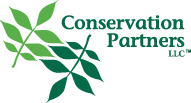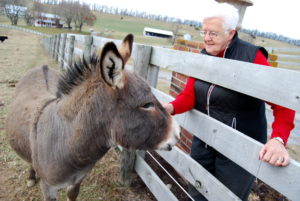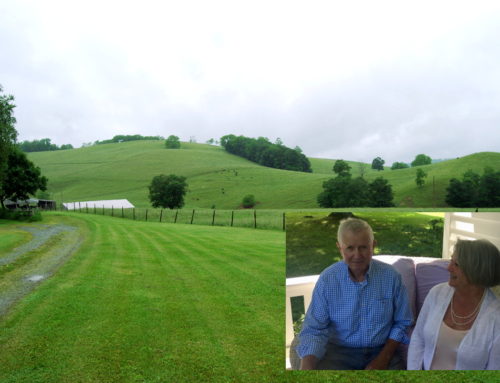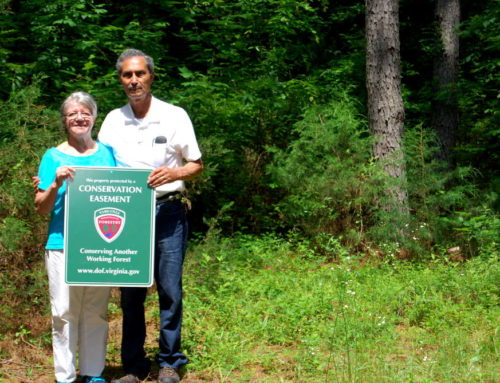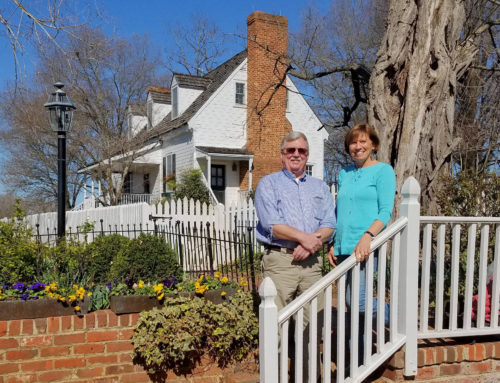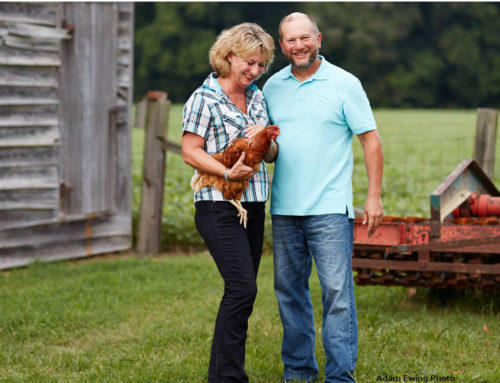Don and Sue Hanger have lived full lives in Augusta County, Virginia. Through the years, they have raised a family — two sons and a daughter — and worked land farmed by their families for generations. For 40 years, Sue worked in the county treasurer’s office. For more than 30, Don was a teacher at Valley Vo-Tech, now Valley Career and Technical Center, part of the Augusta County school system. Don even served 12 years on the Augusta County Board of Supervisors.

The Hanger family raises beef cattle and crops on Berry-Moore Farm (Conservation Partners Photo by Butch Irvine)
Last year, having passed much of the work on the farm to their two sons, Neil and Scott, the couple made an important decision. They decided to protect their land from the development they’ve seen take over other county farms.
Don and Sue have placed the 297-acre Berry-Moore Farm, which has been in Sue’s family since her great grandparents owned it – and before that was owned by members of Don’s family – in a conservation easement. The easement protects the property from the kind of development that might turn it into a golf course or a subdivision while allowing uses that will contribute to its value as a working family farm.

Sue’s ancestors lived in Berry-Moore House, where son Scott now lives. (Conservation Partners Photo by Butch Irvine)
For instance, a limited number of additional houses may be built for family members of coming generations who may want to live and work on the farm. Additional farm structures may also be built.
Son Neil Hanger worked closely with the Virginia Outdoors Foundation (VOF) to craft an easement agreement that protects the conservation values of the land while allowing the Hanger family the flexibility they will need as time passes. The Virginia Outdoors Foundation is a partner organization that will “hold” the easement, ensuring that its terms — which the family helped fashion — will be enforced forever and the land forever protected, even if it is eventually sold.
Conservation Partners introduced the Hangers to VOF and a number of professionals who made sure the process of placing the easement went smoothly. Staff at Conservation Partners mapped the property and completed the baseline documentation report for the VOF’s review. Conservation Partners works closely with accountants, appraisers, lawyers, and state officials to make sure experts are available to landowners every step of the way and that every step occurs correctly and on time.
The Hangers even took advantage of Conservation Partners’ Advance Funding Program, which covered all their costs until the process was completed and the benefits secured. Conservation easements, which may be treated as charitable contributions, can generate significant tax benefits, including transferable state income tax credits that may be sold for cash.
“Conservation Partners kept us informed about what was going on and what to do next,” said Sue.
Not only does the conservation easement protect the Hangers’ land, but it also settles questions that can be difficult as land transfers from one generation to the next.
Taylor Cole, Conservation Partners’ Director of Landowner Services, notes that conservation easements are a planning tool: “Don and Sue, with important input from their kids, have made the decisions, and now they don’t have to worry about the future of their land and neither do their kids.”
Don agreed. “It’s planning for the future, so we can go to bed and sleep.”
To talk with Conservation Partners about protecting your land, contact us at 540-464-1899 or info@conservationpartnersllc.com.
